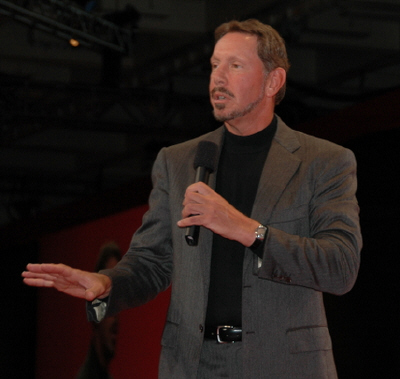Ellison offers full support service for Red Hat Linux at half the price

After a ceremonial closing bell of NASDAQ by Oracle executives, fed live to NYC, Oracle CEO Larry Ellison took the stage and evangelized for Oracle's scale out grid computing strategy. PC servers if they fail in a grid, you just don't care...you tolerate the failures," Ellison said.

As he was going through the virtues of grids, he talked about choosing Linux over Windows for Oracle's grid initiative in 1998. The standards-based, open source platform allowed Oracle to add features in performance, reliability and security, Ellison said.
Now he is mentioning investments in Red Hat and VA Linux, and building a file system for Linux and open sourcing it and the "Unbreakable Linux" program instituted in 2002 in which Oracle takes responsibility for fixing priority one bugs in the Linux kernel, and open sources the fixes. He continues his tale of Linux and Oracle, citing dedicating engineering and support teams.
He listed key issues that are slowing the adoption of Linux and Oracle database grids running on Linux. Most glaring is true enterprise support, which is unavailable from Linux vendors. Bugs are not necessarily fixed in the versions companies are running, but fixed in future versions, Ellison said. To get the fix you have to upgrade, which Ellison said isn't acceptable to Oracle's large customers. In addition, Ellison cited expensive support from leading Linux vendor ($1499 per year for a 2 processor server, he said) and concerns about intellectual property indemnification.
As of this moment Ellison announced full support for Red Hat Linux. "If you are a Red Hat Linux support customer, you now have a choice. You can easily switch from Red Hat to Oracle support, and we will back port your bug fixes, indemnify you from intellectual property problems, and charge way less than half what Red Hat charges," Ellison said.
"We are not trying to differentiate ourselves from the Red Hat code. We will synchronize our system with Red Hat releases," Ellison added. "We are not trying to fragment the Linux market."
Oracle is taking Red Hat code, taking out trademarked material, putting in bug fixes and compiling it for customers for whatever version they have. Oracle created an Unbreakable Linux Network and customers can receive software updates incrementally. Red Hat customers don't need to remove anything from their servers if they bind to the Oracle Linux Network, which takes about 90 seconds.
The benefits of Red Hat open source code has spawned a serious competitor to its business.
The goal is to enhance and speed the adoption of Linux and make it mission critical in the datacenter. For big enterprises, Ellison said. Oracle's premier level support (ranging from $1199 to $1999) for a two processor server is not available from Red Hat.
For next 90 days Oracle is offering 50 percent off list pricing (until January 31, 2007). It will be interesting to see how Red Hat and Oracle get along going forward, given that Oracle is focused on soaking up Red Hat's support revenue stream and at the same time has standardized on its Linux distribution. I guess Ellison didn't see much point in acquiring Red Hat...and now he has a complete stack from bottom to top.
"I don't think Red Hat is going to be killed. We have lowered prices and perhaps they will respond by lowering prices. This is capitalism. We are on the side of pushing open standards in software and Linux is an important part of the that movement. It is strategically important for us and our customer and that open standards wins in the enterprise. this isn't about Red Hat, it's about increasing the adoption of Linux in the datacenter," Ellison said during a Q&A after the announcement.
Ellison was also asked about software as a service. He said Oracles SaaS business was the same size as salesforce.com's. "We think its very important, but don't think its black and white, and people will get all software as a service," Ellison said.